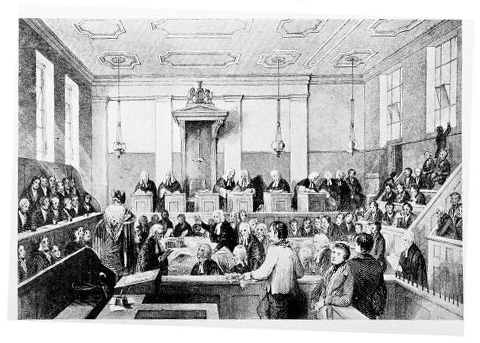
On Tuesday the 31st of March 1691, following the Assizes at York, Mr.
Edmund Robinson, condemned for high treason the previous week, was executed. A
married man with a son, he was one of eleven convicted criminals hung that day.
Two were executed for murder, two for burglary, three for horse-stealing and
one for burning down a barn.
Edmund Robinson, born in Colne Parish in the County of Lancaster ,
Nicholas Battersby of the City of York , and
Robert Cokeson from the Parish of Wakefield in the County of York
The day before their execution the Reverend George Halley MA preached a
sermon at York Castle London Yorkshire . He also preached for
a year at Haworth in the Parish of Bradford, a
place later to become the home of the Bronte family. Edmund Robinson, however,
was not an exemplary curate. He forged licences, conducted clandestine marriage
celebrations and, according to Halley, was actively ‘impairing and Counterfeiting
the King’s Coyn’ when living in the Parish of Kirk-Burton.
At school it seems Robinson had struck up a friendship with a young man called Greggson whose father had a reputation as a ‘Coyner’ and who was himself later executed atLancaster 

At school it seems Robinson had struck up a friendship with a young man called Greggson whose father had a reputation as a ‘Coyner’ and who was himself later executed at

Suspension and excommunication by the church does not seem to have put
a brake on Robinson’s career as a coiner and counterfeiter. At the York Assizes
of 4th March 1678, he was acquitted on a charge of coin-clipping but convicted
‘for uttering false Money’ and fined twenty pounds. The following year, at the
York Assizes of 17th March 1679, he was ‘again Convicted of Uttering False
Money’ and this time fined five hundred pounds. At the York Assizes of 1st
August 1685, he was again tried for coining and acquitted. ‘But’, observed Halley, ‘though the Pitcher goes oft to the water, it
comes home broken at last’; at York
Robinson denied his guilt throughout his trial and used all the legal
challenges and extra-legal manoeuvres available to defend himself. ‘Never Man
produc’d more Witnesses to invalidate a single Testimony’, observed Halley:
‘some of them did very wonderfully agree together,... their words were the very
selfsame, there was not one tittle Difference or Variation, by which and some
Cross questions it plainly appear’d that they had conn’d their Lesson
Together.’
Mistakenly thinking he would be able to buy himself a reprieve, Robinson, much
to Halley’s dismay, remained defiant to the last, neither confessing his crime
nor repenting his sins:
But alas! after he had taken a
solemn Leave of his Son... and given him a Charge to be dutiful to his Mother,
and the like, when he ascended the Ladder, instead of performing the Religious
Duty I press’d him to, instead of imploring the Mercy and Forgiveness of God
for his great and manifold Transgressions of the Laws, both Humane and Divine,
and particularly for the Scandalous Life he had led, when being taken under the
highest obligations to the contrary, as having taken Holy Orders upon him,
instead of expressing an Universal Love and a Catholick Charity, he did nothing
but bitterly inveigh against the Law, the Judge, the Jury, the Witness, and
against the Clerk of the Assize, for producing the records of his former Trials
against him. Thus he died in the Pett, thus he expir’d rather in a Transport of
Rage and Fury, than with a Christian Temper and Disposition.
Source
Halley,
George, 1691. A Sermon Preach’d at the
CASTLE of YORK, to the condemned prisoners on Monday the 30th of March, 1691,
being the day before their execution. With an Appendix: A Short Account of Mr. Edmund Robinson, who
was Condemn’d for High Treason, in Counterfeiting the King’s Coin, on Monday
the 23 of March 1691 and Executed on Tuesday the 31st of March, 1691.
London.
No comments:
Post a Comment